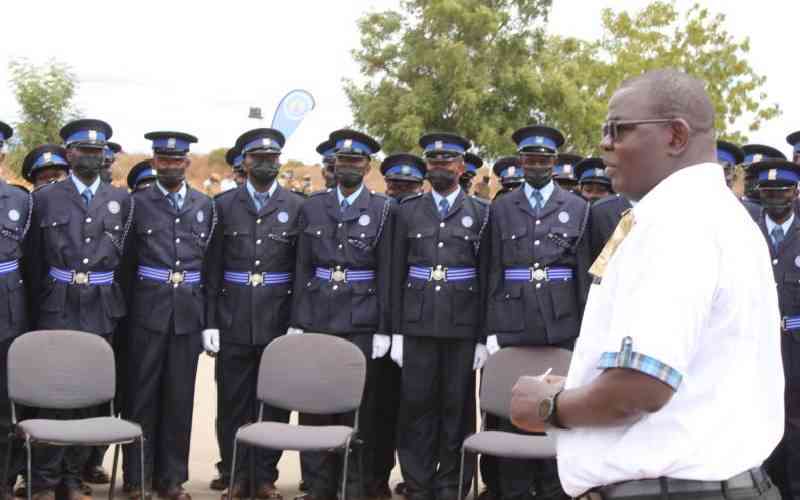The Jubilee Government appears to have softened its stance on the controversial Security Laws (Amendments) Bill that attracted intense opposition from various quarters.
Two days after President Uhuru Kenyatta vigorously defended the proposed changes as a way to fight terrorism and revealed he had been approached by the Commission for the Implementation of the Constitution (CIC) over some of the clauses in the draft law, Jubilee MPs are now reaching out to the Opposition for a consensus.
The Government's leadership in the National Assembly where the bill is awaiting debate by the Committee of the whole House, yesterday revealed they had lined up meetings with those opposed to the draft laws to ensure it is 'bi-partisan' legislation and enjoys broader support.
Already, CIC has raised several clauses in the bill that it wants amended, saying they were in conflict with the supreme law.
CIC Chairman Charles Nyachae told The Standard he presented proposals to the State to cure the problems with the bill.
Nyachae said following his meeting with President Kenyatta and his deputy William Ruto, he hoped the clauses touching on basic freedoms and penalties prescribed for the media would be reviewed.
Uhuru alluded to the amendments proposed by the commission in his Jamhuri Day speech last Friday.
Yesterday, National Assembly Majority Leader Aden Duale said he had scheduled meetings from today with CORD legislators and other stakeholders to strike a deal before the amendments are tabled on Thursday at the National Assembly for discussion by the Committee of the whole House.
Duale has also invited media owners, the Editors Guild, civil society groups and other interested parties to iron out contentious issues with a view to shelving clauses perceived as offending.
"The National Security committee is winding up the public participation process tomorrow (today). On Tuesday and Wednesday I will be meeting with our colleagues from the Opposition so that we build consensus," he told The Standard from Paris, France.
Duale, who returns to Nairobi this evening, said he would host media owners and editors for breakfast on Thursday morning shortly before the House reconvenes for a special session to debate and pass the amendments.
MOTION NOTICE
On Thursday, the lawmakers will hold two sessions. In the morning, the National Assembly's Committee on National Security chairman will table his report and file a notice of motion for the afternoon.
The same team will also table the report on the nomination of Major General (Rtd) Joseph Nkaissery as Interior Cabinet secretary, which will be adopted in the afternoon.
They will then proceed to debate the security laws, with Duale expected to move amendments on issues termed as unconstitutional by CIC.
Stay informed. Subscribe to our newsletter
"There are more than 90 per cent of clauses which are good in combating terrorism. Tomorrow will be the day of public participation and the committee's report will be ready by Tuesday morning. I will then reach out to our colleagues (in CORD) so that we clean that bill to remove any harmful clauses. We will also incorporate all proposals from the public and the CIC," said Duale.
National Security Committee Vice Chairman Alois Lentoimanga said Jubilee MPs were already reaching out to their CORD colleagues to bridge the differences that arose during debate on the bill.
VICTIMS' IMAGES
On the section that compels media houses to seek police permission before publishing or broadcasting images of victims of terrorist attacks, Lentoimanga said discussions with CIC had reached a consensus that would see various amendments introduced into the clause.
"We are not seeking to gag the media. We met with CIC and agreed that we are going to introduce amendments to the section in a way that is specific, and does not give anybody the opportunity to abuse its provisions," he said.
National Security committee is to meet various stakeholders, among them the Kenya Human Rights Commission, which, together with other civil society organisations is bitterly opposed to some of the provisions in the bill.
"As a committee, we will make amendments after receiving views from stakeholders," said Lentoimanga.
"This bill is not targeting law-abiding citizens or media, but terrorists or sympathisers of terror," said Defence and Foreign Relations Committee Chair Ndung'u Gethenji.
Among the clauses CIC wants amended is the blanket power given to the spy agency, National Intelligence Service (NIS), to monitor all communication without first securing court orders as is currently the case.
Although CIC says NIS can enjoy those powers, they should be subject to a court order.
"We have raised a concern on NIS tapping into your conversations without any court order and we are saying this was too broad power that must be subject to administration process like a court order," said CIC Commissioner Kamotho Waiganjo.
He said the commission also expressed its concern over the provision that allows the National Police Service Commission to vote on sacking the Inspector General of Police as opposed to a tribunal.
CIC has also noted the bill's infringement on the Bill of Rights and media freedom enshrined in the Constitution in a clause demanding that journalists seek permission from the police before publishing pictures of terror victims, and another giving powers to the Interior Cabinet secretary to gazette places and times to hold protests, rallies, meetings and public forums.
 The Standard Group Plc is a
multi-media organization with investments in media platforms spanning newspaper
print operations, television, radio broadcasting, digital and online services. The
Standard Group is recognized as a leading multi-media house in Kenya with a key
influence in matters of national and international interest.
The Standard Group Plc is a
multi-media organization with investments in media platforms spanning newspaper
print operations, television, radio broadcasting, digital and online services. The
Standard Group is recognized as a leading multi-media house in Kenya with a key
influence in matters of national and international interest.
 The Standard Group Plc is a
multi-media organization with investments in media platforms spanning newspaper
print operations, television, radio broadcasting, digital and online services. The
Standard Group is recognized as a leading multi-media house in Kenya with a key
influence in matters of national and international interest.
The Standard Group Plc is a
multi-media organization with investments in media platforms spanning newspaper
print operations, television, radio broadcasting, digital and online services. The
Standard Group is recognized as a leading multi-media house in Kenya with a key
influence in matters of national and international interest.










